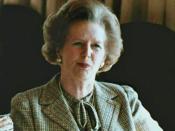When one is considering the impact that both John Major and Tony Blair have had upon the role of Prime Minister and therefore the power related to that role it is important to look also at the larger role of the Prime Minister itself. The power of a Prime Minister in the parliamentary system of the UK depends largely upon four main facets. These facets are that of party, policy, personality and popularity. Taking all of these facets into account it is perhaps easy to understand that combined they can provide very different forms of British Premiership with massive variances in perceived power as well as political effectiveness.
In the case of British Prime Ministers it is important to consider the party they represent, as this has tended to represent a great deal about them, their policies and the power base that they have. The range of parties in the UK system, although essentially quite centrist, represent different policies and approaches to government and the role of opposition whilst also having different ways and means to selecting their leaders and of course when in power the head of government.
Due to the element of influence a particular party can have in it is important to understand the stereotypes and presumptions about the parties and how important this can be in forming a power base for the PM.
Although the parties have developed over time the age of the British parliamentary system does secure the parties, and therefore their leaders with some guaranteed support groups within the population on both social and economic issues. Voting trends amongst the electorate during recent history has largely remained the same with individuals from certain social groups tending to vote with a party that has historically identified with their particular group. An example of this...


